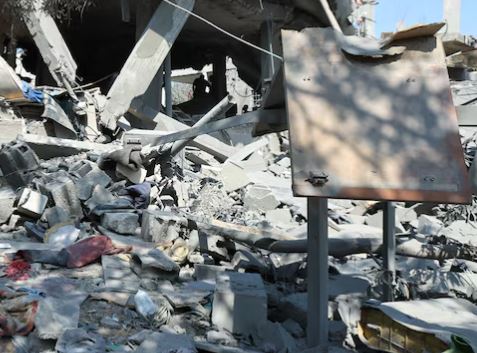Introduction: Surge in Violence and Escalating Tensions
The conflict between Israel and Palestine has seen a disturbing escalation following recent Israeli airstrikes. On August 3, 2024, an Israeli airstrike targeted a school in Gaza City, resulting in the deaths of at least 15 Palestinians. This strike occurred just hours after two separate assaults in the West Bank killed nine militants, including a local Hamas commander. These actions have intensified an already volatile situation and provoked international concern.
Gaza Strikes and Humanitarian Impact
The Israeli airstrike on a school sheltering displaced persons in Gaza City’s Sheikh Radwan neighborhood has drawn widespread condemnation. The school, used as a refuge by those fleeing the conflict, was hit with devastating consequences. According to Hamas-run media, the attack resulted in at least 15 fatalities, further exacerbating the humanitarian crisis in the Gaza Strip.
The Israeli military has justified the attack by alleging that the school was used as a command center for Hamas militants, who allegedly hid and manufactured weapons there. Hamas, however, vehemently denies these accusations, asserting that such strikes deliberately target civilian infrastructure. The recent escalation has highlighted the severe humanitarian toll of the ongoing conflict, with Gaza health officials reporting significant casualties and damage.
West Bank Assaults and Rising Militancy
In the West Bank, Israeli airstrikes resulted in the deaths of nine individuals, including a prominent Hamas commander. The first strike targeted a vehicle near Tulkarm, believed to be transporting a militant cell. This was followed by a second strike aimed at a group of militants who had allegedly fired upon Israeli troops. The Israeli military described these actions as part of a broader counterterrorism operation.
Hamas has claimed that all nine victims were its fighters, while the Islamic Jihad group has also asserted that some of those killed were their members. The increase in violence in the West Bank, which was already high before the recent Gaza conflict, reflects the growing unrest and frequent Israeli raids in the territory sought by Palestinians for a future state.
Diplomatic Efforts and Regional Implications
The escalating violence has prompted urgent diplomatic efforts to prevent further regional destabilization. A high-level Israeli delegation briefly visited Cairo to engage in ceasefire negotiations, although the prospects for a breakthrough appear slim. The Israeli government has accused Hamas of attempting to alter the terms of a proposed agreement, while Hamas has blamed Israeli Prime Minister Benjamin Netanyahu for prolonging the conflict.
The assassination of Ismail Haniyeh, a key Hamas leader, has added to the tensions. Iran and Hamas have both accused Israel of orchestrating the assassination and vowed retaliation. Although Israel has not officially confirmed its involvement, Israeli Prime Minister Netanyahu has stated that Israel has delivered severe blows to Iran’s proxies, including Hamas and Hezbollah.
International Reactions and Calls for Restraint
In response to the escalating conflict, the international community has intensified diplomatic efforts to mitigate the crisis. U.S. Secretary of State Antony Blinken has engaged with French and British officials to advocate for a ceasefire and a resolution to the hostage situation in Gaza. Egypt’s foreign minister has warned of the unprecedented danger posed by recent developments, while Italy has called on Iran to exercise restraint and contribute to de-escalation efforts.
These international interventions underscore the growing concern over the potential for the conflict to spread further across the Middle East. The situation remains highly volatile, with significant implications for regional stability and international relations.
Conclusion: A Conflict in Crisis
The recent Israeli airstrikes, resulting in substantial casualties in both Gaza and the West Bank, represent a significant escalation in the ongoing Israeli-Palestinian conflict. As diplomatic efforts continue to address the crisis, the humanitarian impact and regional implications of these strikes highlight the urgent need for a resolution. The international community’s calls for restraint and dialogue remain crucial in navigating the complexities of this protracted conflict.
Summary
The recent Israeli airstrikes have resulted in significant casualties in Gaza and the West Bank, escalating tensions in the region. The strikes, which targeted a school in Gaza and militant cells in the West Bank, have drawn international condemnation and heightened fears of further conflict. Diplomatic efforts are underway to address the crisis, with calls for restraint from global leaders.
Key Learning Points Table
| Key Learning Point | Details |
|---|---|
| Gaza School Attack | At least 15 Palestinians killed in an Israeli airstrike. |
| West Bank Assaults | Nine militants killed in two separate airstrikes. |
| Humanitarian Impact | Significant casualties and damage reported. |
| Diplomatic Efforts | International calls for ceasefire and resolution. |
| Regional Implications | Increased tensions and potential for wider conflict. |
Soumya Smruti Sahoo is a seasoned journalist with extensive experience in both international and Indian news writing. With a sharp analytical mind and a dedication to uncovering the truth, Soumya has built a reputation for delivering in-depth, well-researched articles that provide readers with a clear understanding of complex global and domestic issues. Her work reflects a deep commitment to journalistic integrity, making her a trusted source for accurate and insightful news coverage.



